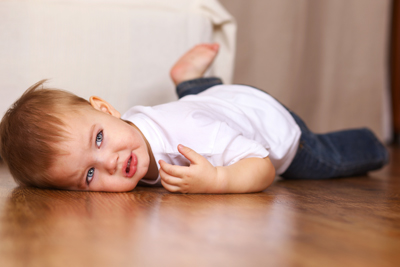I recently got a great question from a member of our parent community about her toddler. Has something like this ever happened to you?
Question: Our 2 year old son has recently started hitting himself in the face and banging his head on the floor during tantrums. It’s happened when we didn’t have more pasta to give him, when he wanted another book before bed, and when it was time to put his sleep sack on. We’ve tried to explain that it’s okay to be frustrated and angry, but hitting hurts. What can we do to help him demonstrate his feelings in a healthier way? Is this common for toddlers? Is it something we should be concerned about?
Answer: Strong emotions are challenging for young children to process. These emotional responses can be very impulsive, physical, and intense. Some children bite, some hit, some push, and some will turn the physical expression onto themselves, as your son is doing. The examples you gave are all great descriptions of typical frustrating moments for toddlers and twos.
Begin by validating the child’s frustration, and teach him an acceptable alternative behavior to do instead. Model “frustration” for him: stomp your feet, clench your fists, or give yourself a big hug. By watching you, the child learns there are other physical ways that can satisfy the expression of a strong emotion. Try to prepare your child for a transition to the next activity. Be as consistent as possible with the number of books you read at bedtime. You may want to allow your son to choose whether to wear a sleep sack or pajamas, now that he’s older.
We want to build resiliency in young children by allowing them to feel disappointed and learn to cope with that emotion as well. When you’re out of pasta, acknowledge the disappointment and allow your child to express his “big feeling” about that. Remain as calm and neutral as possible and let the child know that you will make more pasta tomorrow, or maybe he can come shopping with you to buy more the next day. Involve him in finding a solution and he will be more likely to accept it.
Young children have difficulty regulating strong emotions. When we validate this struggle and redirect a child towards more positive expressions of emotion, we can help him learn this valuable skill.



